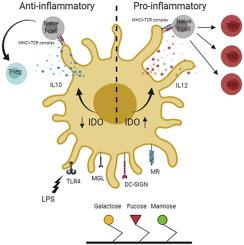Materials Today Bio ( IF 8.7 ) Pub Date : 2020-09-30 , DOI: 10.1016/j.mtbio.2020.100080 M A Alobaid 1 , S-J Richards 2 , M R Alexander 3 , M I Gibson 2, 4 , A M Ghaemmaghami 1, 5

|
New strategies for immune modulation have shown real promise in regenerative medicine as well as the fight against autoimmune diseases, allergies, and cancer. Dendritic cells (DCs) are gatekeepers of the immune system and their ability in shaping the adaptive immune responses makes DCs ideal targets for immune modulation. Carbohydrates are abundant in different biological systems and are known to modulate DC phenotype and function. However, how simple monosaccharides instruct DC function is less well understood. In this study, we used a combinatorial array of immobilized monosaccharides to investigate how they modulate DC phenotype and function and crucially the impact of such changes on downstream adaptive immune responses. Our data show that a selection of monosaccharides significantly suppress lipopolysaccharide-induced DC activation as evidenced by a reduction in CD40 expression, IL-12 production, and indoleamine 2,3-dioxygenase activity, while inducing a significant increase in IL-10 production. These changes are indicative of the induction of an anti-inflammatory or regulatory phenotype in DCs, which was further confirmed in DC–T cell co-cultures where DCs cultured on the ‘regulatory’ monosaccharide-coated surfaces were shown to induce naïve T cell polarization toward regulatory phenotype. Our data also highlighted a selection of monosaccharides that are able to promote mixed Treg and Th17 cell differentiation, a T cell phenotype expected to be highly immune suppressive. These data show the potential immunomodulatory effects of immobilized monosaccharides in priming DCs and skewing T cell differentiation toward an immune-regulatory phenotype. The ability to fine-tune immune responses using these simple carbohydrate combinations (e.g. as coatings for existing materials) can be utilized as novel tools for immune modulation with potential applications in regenerative medicine, implantable medical devices, and wound healing where reduction of inflammatory responses and maintaining immune homeostasis are desirable.
中文翻译:

使用具有免疫指导特性的固定化单糖开发免疫调节材料
免疫调节的新策略在再生医学以及对抗自身免疫性疾病、过敏和癌症方面显示出了真正的前景。树突状细胞 (DC) 是免疫系统的看门人,它们塑造适应性免疫反应的能力使 DC 成为免疫调节的理想目标。碳水化合物在不同的生物系统中含量丰富,并且已知可以调节 DC 表型和功能。然而,简单的单糖如何指导 DC 功能尚不清楚。在这项研究中,我们使用了一系列固定化单糖的组合来研究它们如何调节 DC 表型和功能,以及最重要的是这些变化对下游适应性免疫反应的影响。我们的数据表明,选择的单糖可显着抑制脂多糖诱导的 DC 活化,具体表现为 CD40 表达、IL-12 产生和吲哚胺 2,3-双加氧酶活性降低,同时诱导 IL-10 产生显着增加。这些变化表明 DC 中诱导了抗炎或调节表型,这在 DC-T 细胞共培养中得到了进一步证实,其中在“调节”单糖包被表面上培养的 DC 被证明可诱导幼稚 T 细胞极化朝向调节表型。我们的数据还强调了一系列能够促进混合 Treg 和 Th17 细胞分化的单糖,这是一种预计具有高度免疫抑制作用的 T 细胞表型。这些数据显示了固定化单糖在启动 DC 和使 T 细胞分化为免疫调节表型方面的潜在免疫调节作用。使用这些简单的碳水化合物组合(例如 作为现有材料的涂层)可用作免疫调节的新型工具,在再生医学、植入式医疗设备和伤口愈合等领域具有潜在的应用前景,在这些领域中,需要减少炎症反应和维持免疫稳态。











































 京公网安备 11010802027423号
京公网安备 11010802027423号